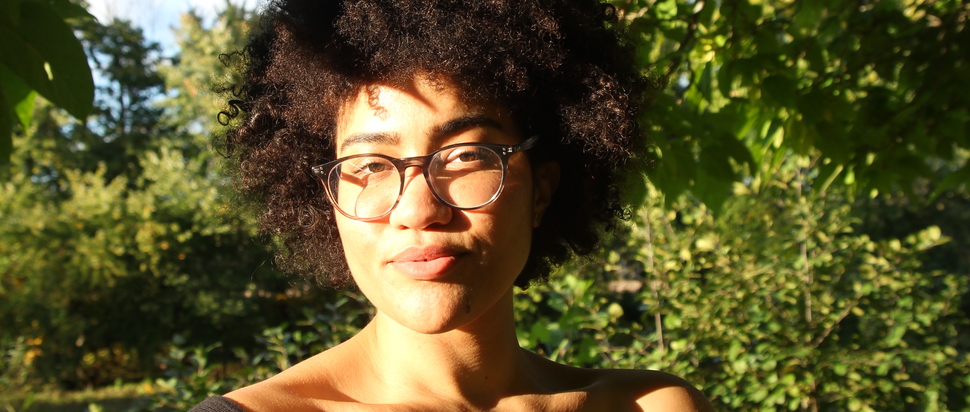Sasha Debevec-McKenney on her poetry collection Joy Is My Middle Name
In her poetry collection Joy Is My Middle Name, American poet Sasha Debevec-McKenney navigates the tragedy and comedy of both past and present
Sasha Debevec-McKenney holds up two copies of her debut collection, Joy Is My Middle Name, on our Zoom call. Fitzcarraldo Editions’ blank white cover, the title held by a royal blue frame; and W. W. Norton’s blue flames that eat into a hot pink, patterned by outlines of American presidents and barbed-wire hearts. “We’ve got both ends of the spectrum,” she says, laughing. The duality is fitting for this collection, which embraces life’s extremes and celebrates the absurdity of our past and present. From reflections on ex-lovers and consumerism, to observations on womanhood and race, Joy Is My Middle Name is a sprawling collection, swinging and spinning itself into each corner of the poet’s life.
Debevec-McKenney is a fan of project books – Maggie Millner’s Couplets is a particular favourite – but her debut collection strays far from such defined parameters. Fitzcarraldo’s inaugural Poetry Editor, Rachael Allen, first found Debevec-McKenney in the Granta slush pile; ever since, Allen has fiercely championed her work. Once commissioned, Debevec-McKenney sent Allen two documents: her MFA thesis and every poem she had written since then (titled 32, in the style of Adele albums). From there, Allen curated Joy Is My Middle Name.
Originally titled POEMS, Debevec-McKenney and Allen were certain no other title would suit the off-handed, all-consuming nature of the collection. Upon surveying her friends, she eventually settled on Joy Is My Middle Name, a title shared by one of her poems. “There's levity to it, but it also kind of comes off as…” she pauses, “like, that phrase is so sarcastic. Do you know what I mean?” Debevec-McKenney doesn’t sacrifice sincerity for irony; rather, she welcomes both at once.
“I grew up in a small town in Connecticut that was founded in 1633. Everything is history,” says Debevec-McKenney. An excess of commemorative plaques and well-preserved mansions maps the town and Debevec-McKenney’s poetic sensibility. The American presidents locate themselves in many of her works; the collection delights in unpicking and exposing the false glory of their image. The aptly named Sestina Where Every End Word is Lyndon Johnson is one such marvel. “When you grow up as someone who is being pushed to push harder on the version of American history that your school teaches you, the presidents are a very easy nut to crack.”
Indeed, much of her adolescence and its preoccupations weave themselves throughout the collection. Debevec-McKenney spent her teenage years watching and re-watching stand-up comedy DVDs at home; now, it’s one of her biggest influences. The realisation first came when watching a video of stand-up comedian, Katt Williams. “We're doing voltas. We're doing turns. We're doing linguistic surprises,” she says. To embrace the poetics of comedy – and, the comedy of poetics – is to embrace the intimate wonders of human connection.
Pop culture at large enjoys itself in Debevec-McKenney’s poetry. “I love reality television,” she says. “I love going to the movies. It's just what I love. So I'm going to use it as an image. It seems like the same thing as the presidents... These are my images. Like, these are my metaphors.” BET Uncut, Fast & Furious, Britney Spears’ Curious, a community theatre production of Seussical – the poems subvert themselves. “I think it's always fun to take a low brow thing and push it into a poem,” she explains. Debevec-McKenney likes to be entertained, to enjoy herself; but Debevec-McKenney also likes to entertain and to encourage others to enjoy themselves.
“Form is a prompt, you know,” says Debevec-McKenney. “It's something that helps me write the poem.” In returning to the collection, she has noticed that her found poems are primarily concerned with addiction and sobriety; in this, the form itself is bound to her own attempts to navigate such matters. For Debevec-McKenney, the poem often chooses its own form – tight and contained or reclining in its free-verse lengths.
“It's a place where I can try and figure out how I feel about stuff and try to be understood. Like, try and make it legible because there's so [many] times in my life where it's illegible,” she says. “And then there's the beauty of a poem, which is that my legible could still be illegible.” The collection orientates, then all too suddenly, disorientates its reader – such is its thrill.
This ambiguity is shared by both reader and writer. “I teach too, and something I always tell my students is that poetry is a place for your most confusing feelings, the things you don't have answers to. And no human emotion is simple, you know. It’s not just straight grief – there's humour too,” she says. Albeit holding a number of accolades, Debevec-McKenney is figuring things out – and, while she does, she’d like you to enjoy it with her.
Joy Is My Middle Name is out 3 Jul with Fitzcarraldo Editions
